If you enjoy watching me react to my very old very high-stakes hands, you've come to the right place. Today I'm going to take a look at a 2010 session played heads-up against Patrik Antonius at the $500/$1,000 limit. With the help of the filter, I left all pots larger than 15 big blinds, so we won't look at raise-folds. I haven't seen these hands for 12 years. I don’t know what to expect, I don’t know how well or badly I played then. Both of us, however, were top 1v1 Omaha players in 2010, so our game was quite suitable for those times. Well, let's get started!
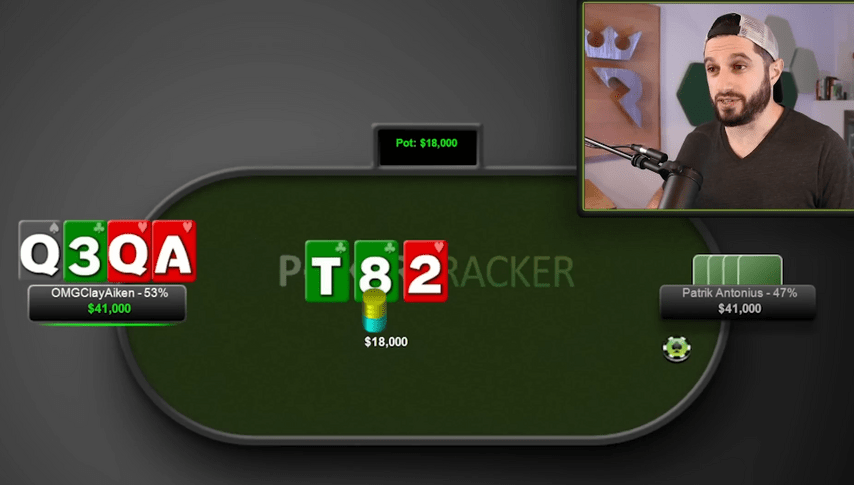
We bought in for 50 bb. I have never been an expert in playing in such stacks, and even now I do not really understand. But with my hand, 3-bet is certainly standard. Patrick called.
For an SPR with just over two flops, it was unsafe, but I think I should pot-bet-call.
Phil bets the pot, and Patrick calls.
His call indicates that he is not beating my hand right now, but he has some kind of draw.
Turn ($54,000, $23,000 effective stack):
Easy push. It's a great card for me, it won't work very often for my opponent.
Phil bets all-in, Patrick calls.
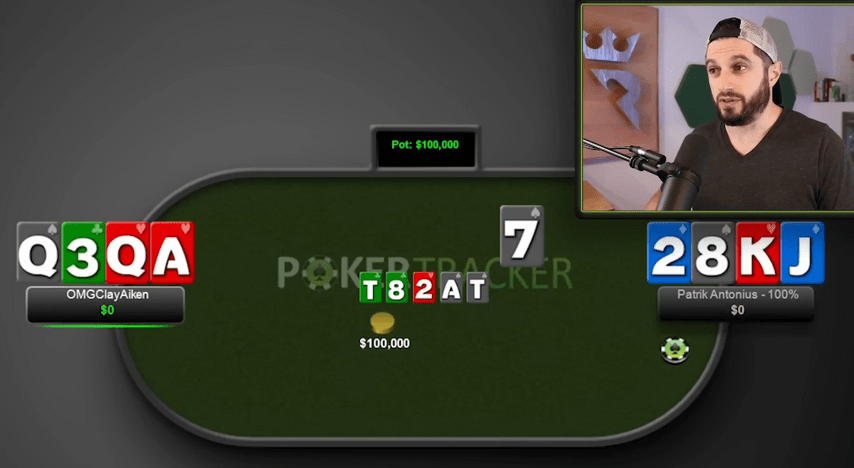
He had two pair on the flop, so I misjudged. He could have shoved right away, but calling is a great line in my opinion because a ten on the turn is a safe bet.
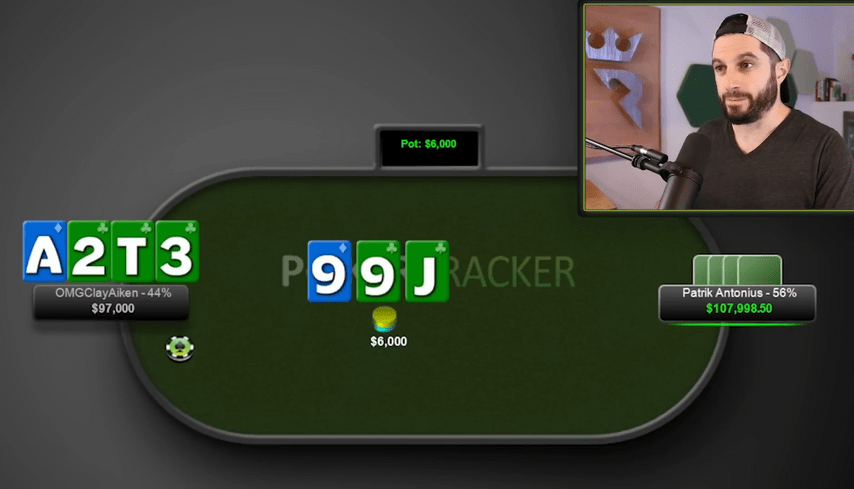
Okay, we continue for 100 bb, everything is in order. I make a standard raise from the button with a rather weak hand, Patrick calls.
Patrick checks, Phil bets $4,000. Patrick calls.
I do not like it. I don't use big sizing here – it's just not worth it. Today I would bet $1,500-$2,000. The hand itself for betting, of course, is quite suitable.
Turn ($14,000):
Patrick checks, Phil bets $10,500. Patrick calls.
I don't mind a second barrel with my hand, and I don't mind the turn sizing either, although Patrick's range after the call should be pretty tight. In general, I like everything.
River ($35,000):
Patrick checks. Phil bets $27,500. Patrick calls.
Pretty interesting river. I decide to bluff; now I would only use the pot, not 3/4 of the pot or whatever I made there. I like bluffing, the turn and river have improved a lot of my hands.
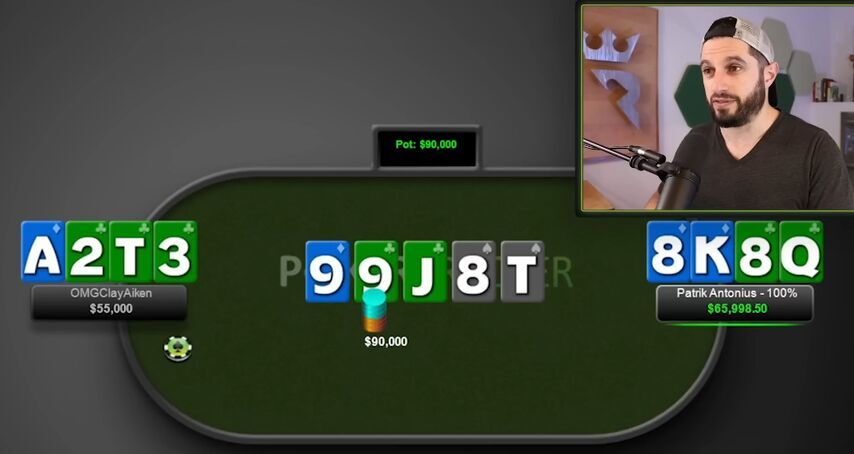
There is a smaller full house. Post-flop, he played the standard, but pre-flop, in my opinion, this is a 3-bet. For me, postflop, except for sizing, is fine too.
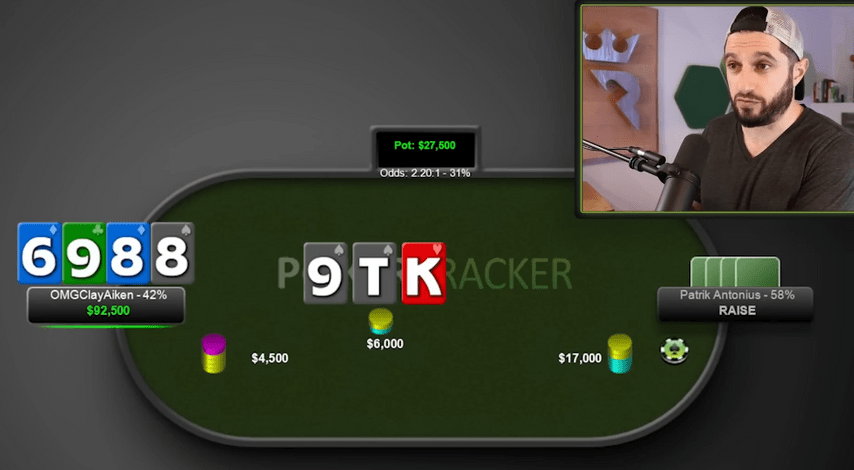
Patrick limped and called my raise. Not sure if I should isolate with this hand, but overall a logical move. I bet a big c-bet on the flop, but today I would prefer a small sizing with my entire range. He raises and of course, I fold.
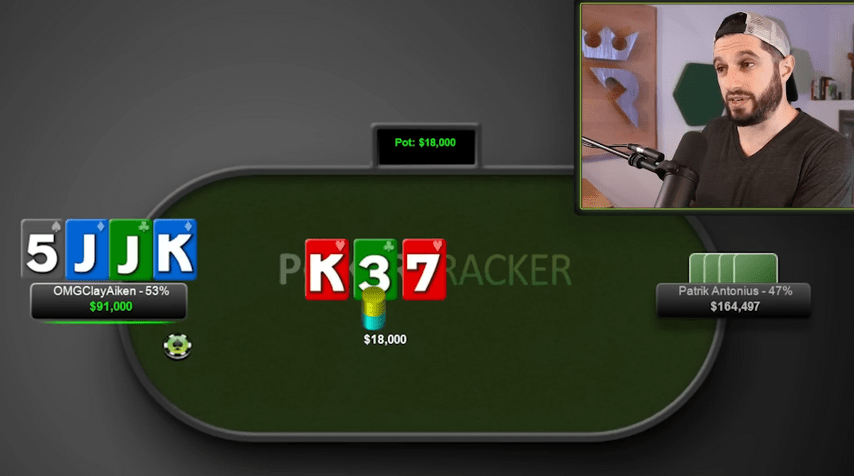
I open and call the 3-bet. Looks good.
Patrick checks. In those days, they didn’t really like to check ... I check next.
Turn ($18,000):
He checks again, and so do I.
River ($18,000):
After he checks a third time, it's quite possible that I have a half-pot extra for me. But checking is also okay. I check.
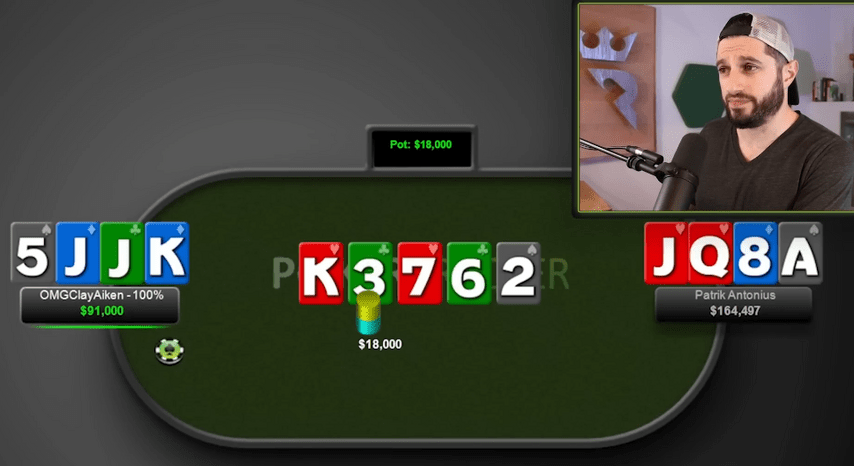
It seems odd that he didn't find a bluff anywhere, but it makes sense. He might check-call on the flop, a bad card comes on the turn and he should probably check with all hands, and a bad card for his range comes again on the river.
So far we are not playing as badly as I expected!
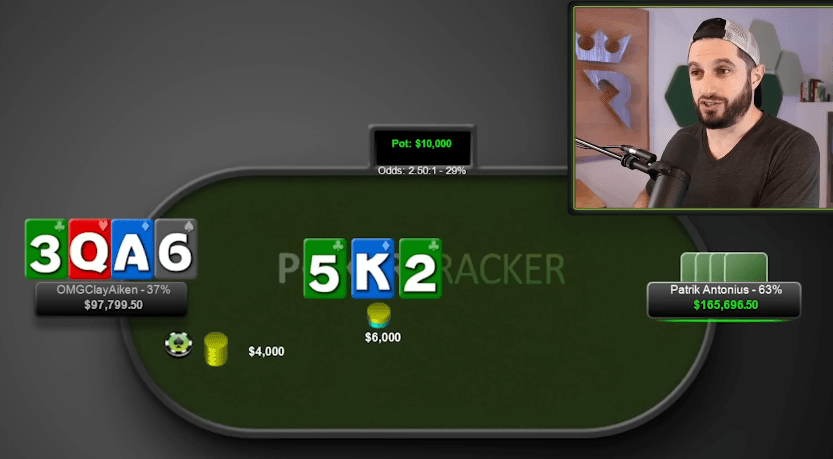
I raise the flop and c-bet, and agree with this decision.
Patrick calls.
Turn ($14,000):
Patrick checks and Phil bets $8,000.
Well, that's very bad. Ha ha ha! On the turn it is not profitable for me to block an ace, three, and six, as I want him to check-call the flop with these cards. Also in his range are many and lots of flushes. Quite a bad bet on my part.
Patrick calls.
River ($30,000):
Patrick checks.
Interesting river. I still feel like giving up would be the best move, but now my hand is not the worst for bluffing.
Phil checks next.
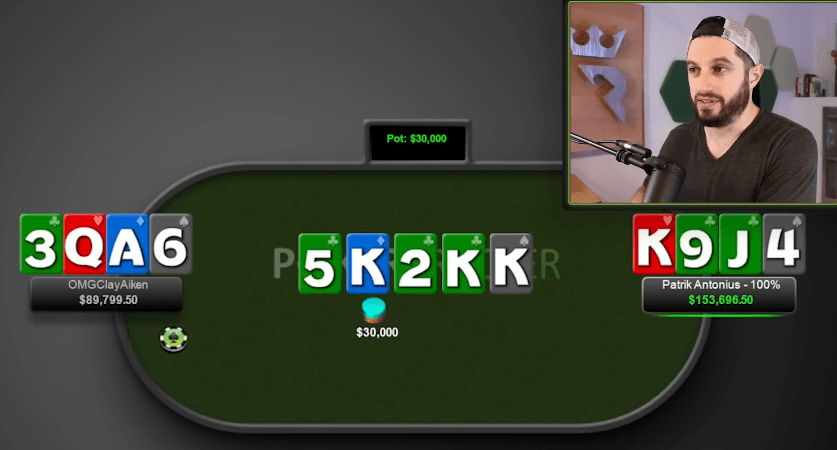
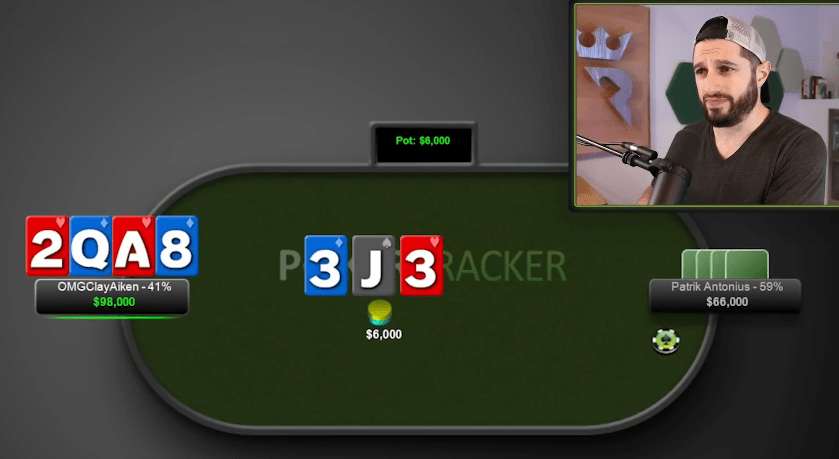
Phil checks and Patrick refuses to c-bet and checks back.
Turn ($6,000):
Phil bets $4,500.
I test bet on the turn, sizing is fine.
Patrick calls.
River ($15,000):
Patrick checks.
I need to give up.
Phil checks next.
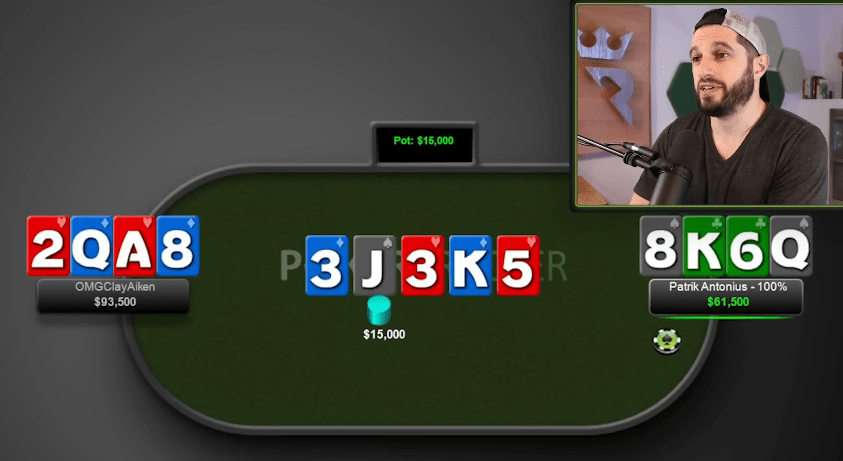
His line is pretty standard.
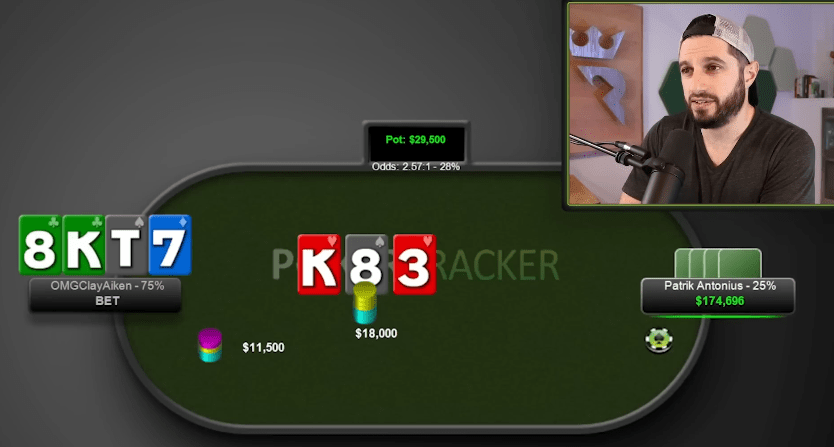
Preflop, I put the correct 3-bet, cool, did not expect that. And continued aggression on the flop is, of course, good.
Patrick raises to $52,500.
Forces us to call it off. There will be a lot of hands like K+flush draws, maybe or , although with he would not reraise the full pot.
All-in, call.
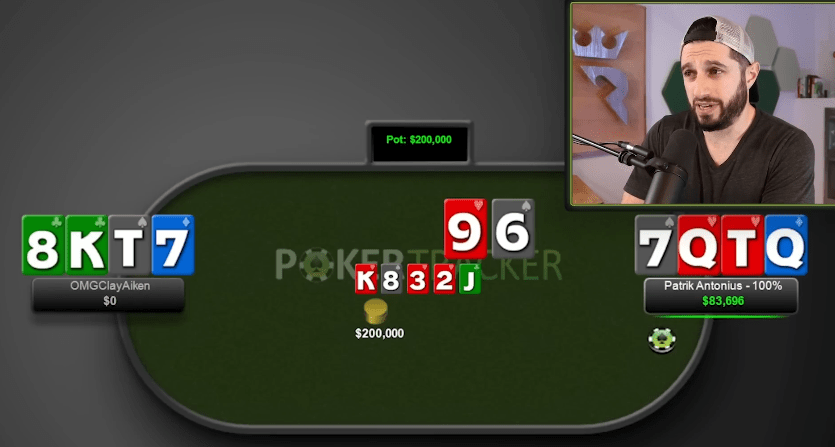
Oh no. Very poorly played on his part. On the flop, he makes me fold all myweaker hands... Well, actually, I can call with weaker hands, for example, with nut hearts, but still, he will not see anything better than a coin flip. None of the or , with which I c-bet, I will not fold. Well, maybe I'll throw out some, but a very small part.
OK. Before that, I played badly, now he did. But his mistake was more expensive because it happened in a pot worth $200,000.
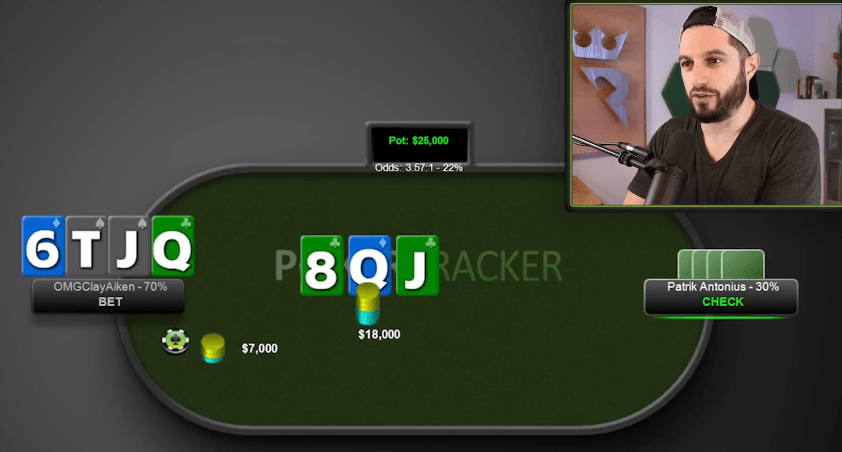
I opened with a raise and called the 3-bet. On the flop he checks and I bet about a third of the pot. The flop came to my hand, I will always bet with it. By the way, in his place, I do not play from a 100% check, because this is not the worst texture for a 3-bettor.
Patrick calls.
Turn ($32,000, $60,500 effective stack):
Check – check.
Right.
River ($32,000):
Patrick checks.
And now a very simple pot-bet on the river.
Phil bets $24,500. Patrick folds.
I don't like sizing less than a bank – I don't see the point in it. But in those years, that's how I played.
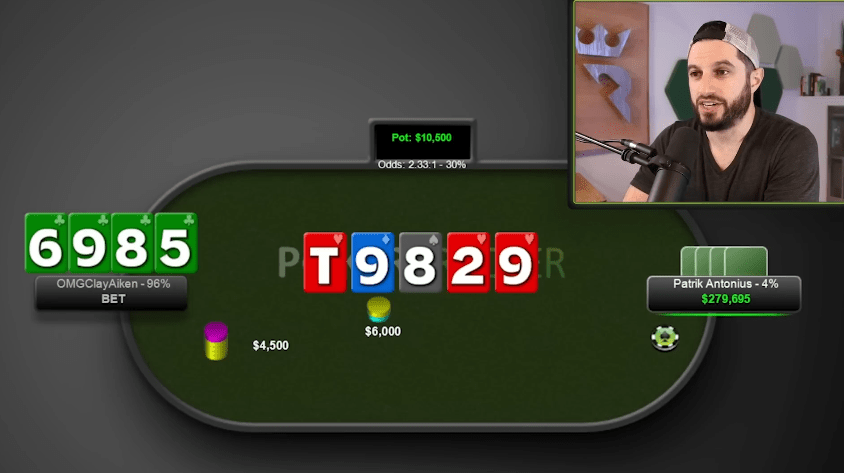
Oh, how bad! So far everything has been fine: calling the raise from Patrick, andchecking the flop and the turn. But here I just have to check-raise! I don't have any hearts, that's the most important thing. I also block – a combination that will never bet, but will often call.
Patrick calls.
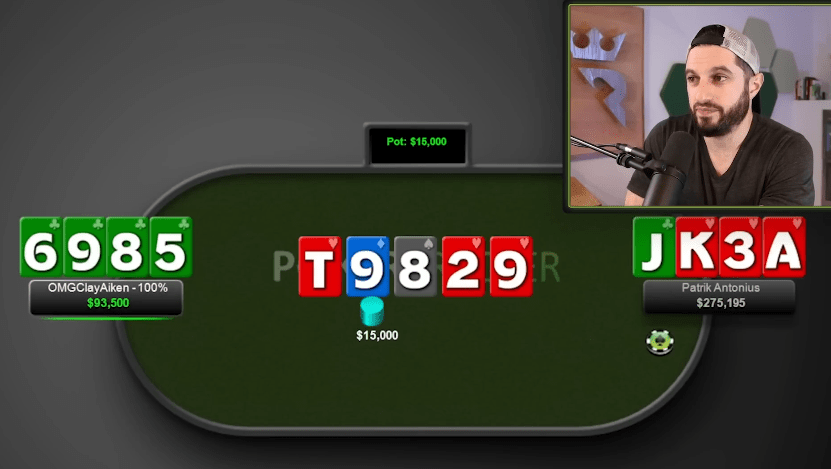
Yes, against this hand I would always check-raise and maybe even get called.
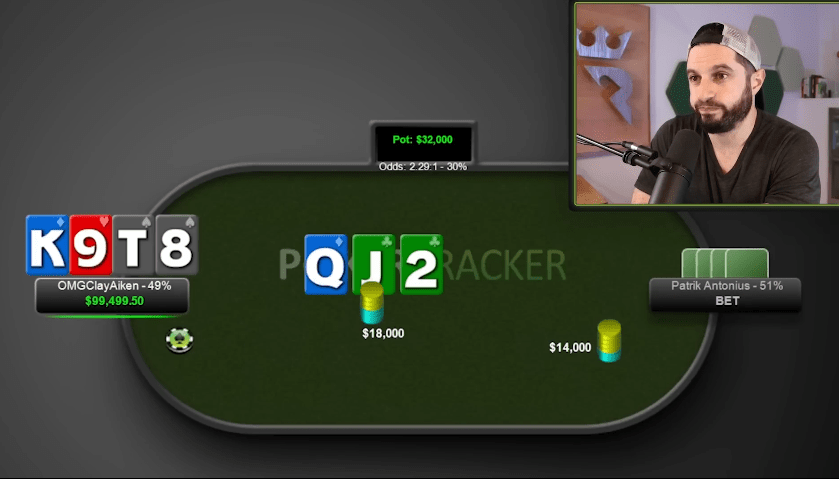
Raise, call 3-bet, it's fine. A big continuation bet should normally be called.
Phil calls.
Turn ($46,000, $85,500 effective stack):
Patrick bets $46,000.
I hit the second nuts and he bets the full pot! Oh... This is actually a very difficult spot. He portrays , may also have or with diamonds or clubs.
Knowing my game, I will assume that I will not fold. Going on, I like calling more than all-in because on some rivers I can save money against . But both all-in and folding are also good options, I like everything!
Phil bets all-in. Patrick calls.
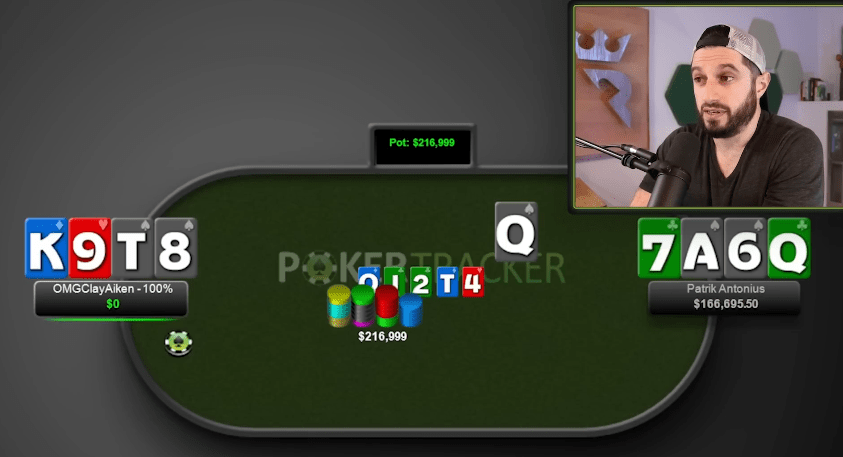
I like his bet on the flop, but I would check on the turn. It's not uncommon for him to be practically dead: when I have the nut club with some or . However, in general, I would call his line somewhat loose, but not insane.
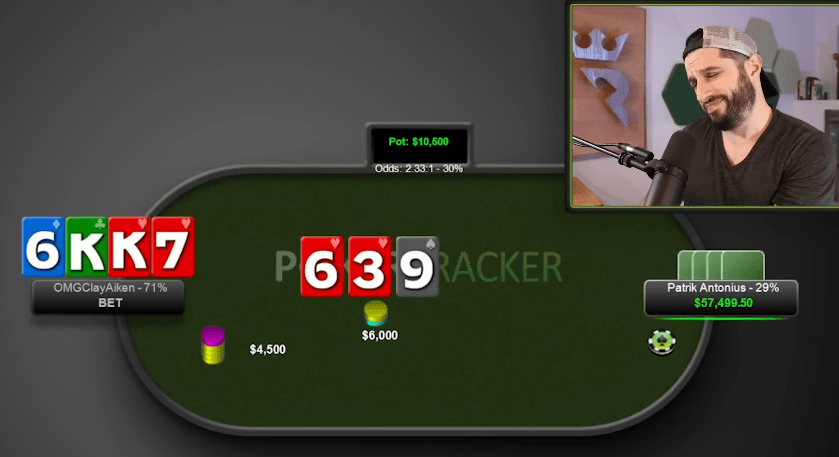
He limped preflop and called my raise. On the flop, I'd rather see a check with the idea of check-raising. This is a bad texture for my range.
Patrick calls.
Turn ($15,000):
Here I like a small bet or check.
Phil bets $10,500.
A big bet is very bad, don't do it, Phil!
Patrick calls.
River ($36,000, $42,500 effective stack):
Phil checks. Patrick checks.
Checking the river was correct. He checks next, which means I won.
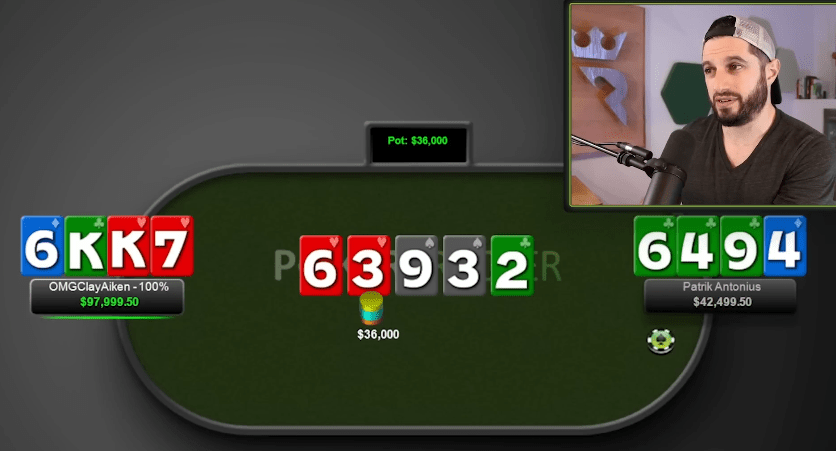
OK. I think his game on all streets is ok.
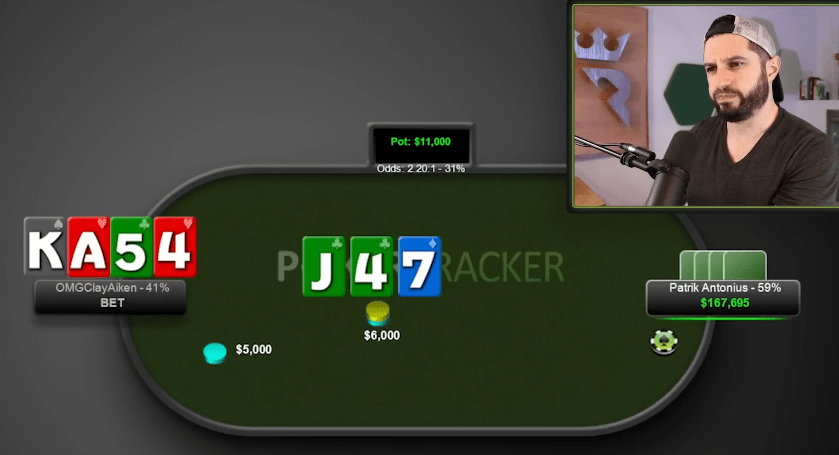
He raised preflop and I called. This hand seems to be worth 3-betting, although we have deep stacks, maybe calling is fine too.
On the flop, I suddenly donk lead for almost the pot. What is that all about? We're probably playing two tables, I got a little distracted and decided on the flop that I had raised a limp. There is simply no other explanation. On this texture, I should not have a betting range, and if I do, what kind of hand selection is this?
Patrick calls.
Turn ($16,000):
Check – check.
River ($16,000):
Check – check.
I don't know how to analyze this hand, but I like checking on the river.
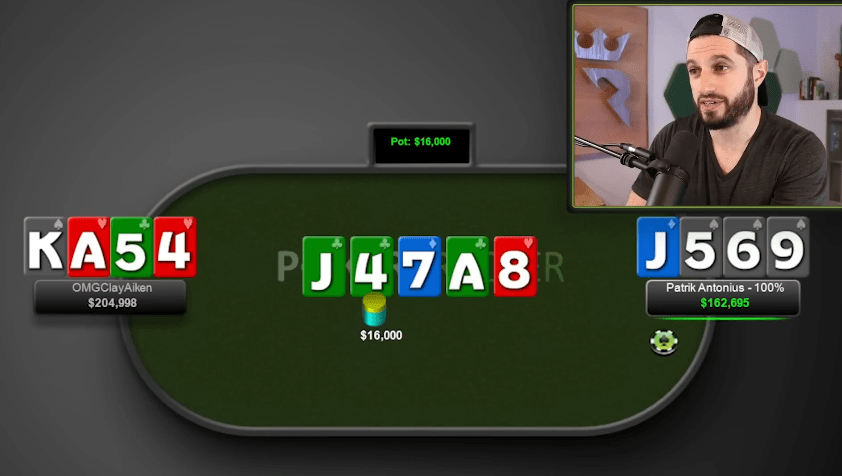
Punished for a terrible flop bet! Am I sure I didn't make a mistake with the action? No, that's right, he raised preflop :)
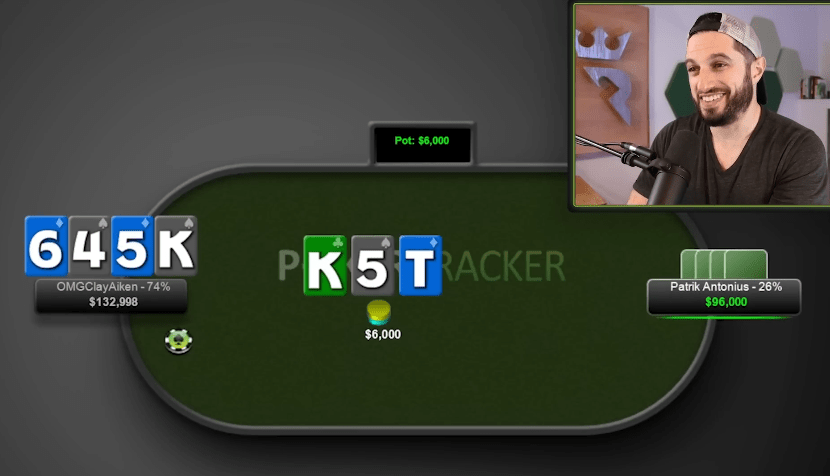
Patrick checks, Phil checks next.
My decision not to c-bet is completely justified, I like it.
Turn ($6,000):
Patrick bets $5,000. Phil calls.
Not a very happy call on the turn... to be honest, I think it's more like a fold in general. Okay, it can't be too bad.
River ($16,000):
Patrick checks, Phil checks.
If I somehow had a one-pair hand, I would bluff. With two, no.
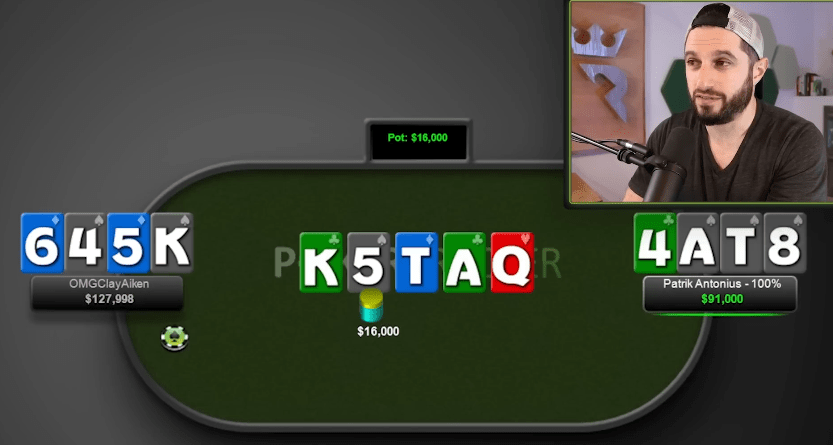
Wow, bad bet for him on the turn, he should check-call. However, I made a bad call, which justified his line.
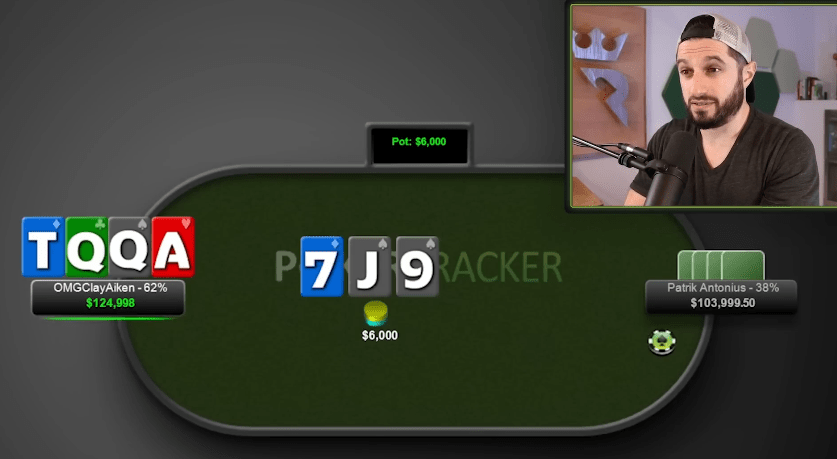
Phil checks and Patrick cbets to $5,000. Phil calls.
Okay, standard.
Turn ($16,000):
Phil checks. Patrick bets $13,000. Phil folds.
Uh... I think against his style I should call on the turn as well. I have a lot of nut outs and his turn betting range is very mixed. And in general, I can be ahead. Fold I don't like.
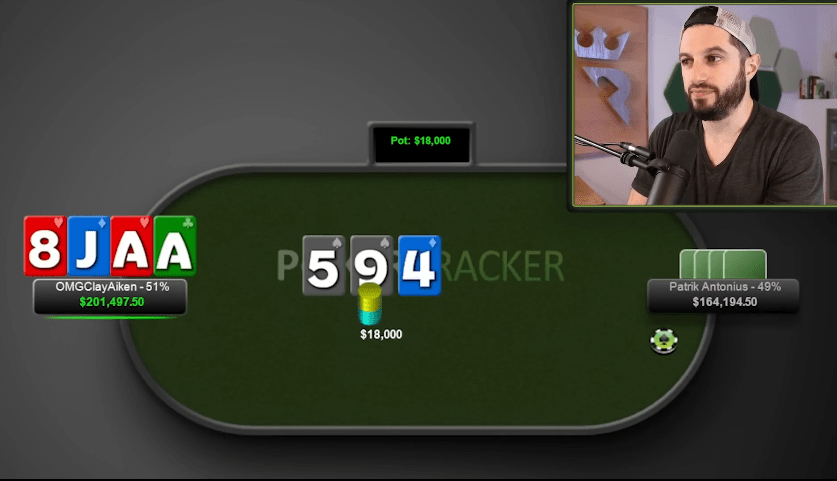
Phil bets $12,000.
After 3-betting, I should check this flop. He's not the worst for me, but a check would be clearly preferable.
Patrick calls.
Turn ($42,000):
Check-fold.
Phil checks. Patrick bets $22,500. Phil folds.
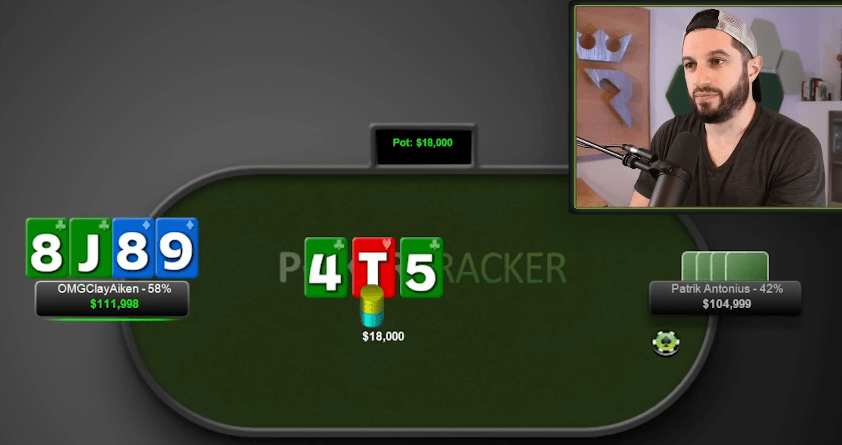
After 3-betting this flop, it looks good for me to check.
Phil checks, Patrick checks.
Turn ($18,000):
And here you have to check. If the opponent bets, call.
Phil checks, Patrick bets $12,000. Call.
River ($42,000):
Phil checks, Patrick checks.
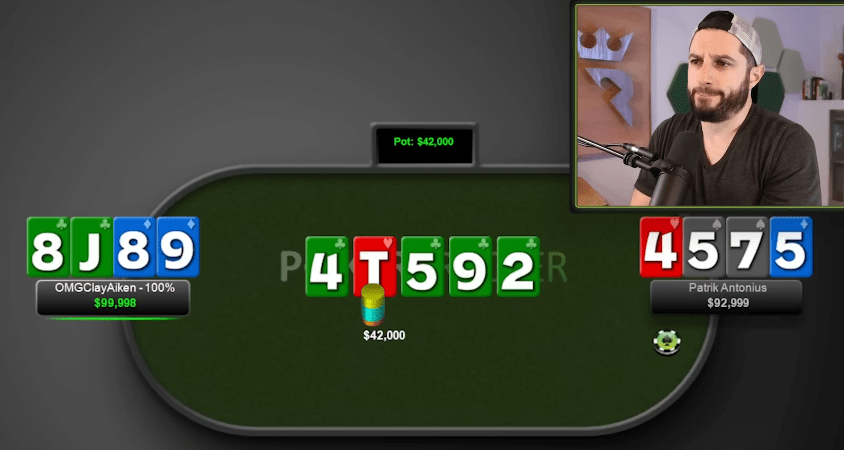
Um. Well, betting the turn is fine, but checking the flop is terrible. I can check-shove with a flush draw, and it's worth it. In general, it is very rare to check a set afterward, and for this, we usually have to block top pair. A low pair blocker doesn't matter.
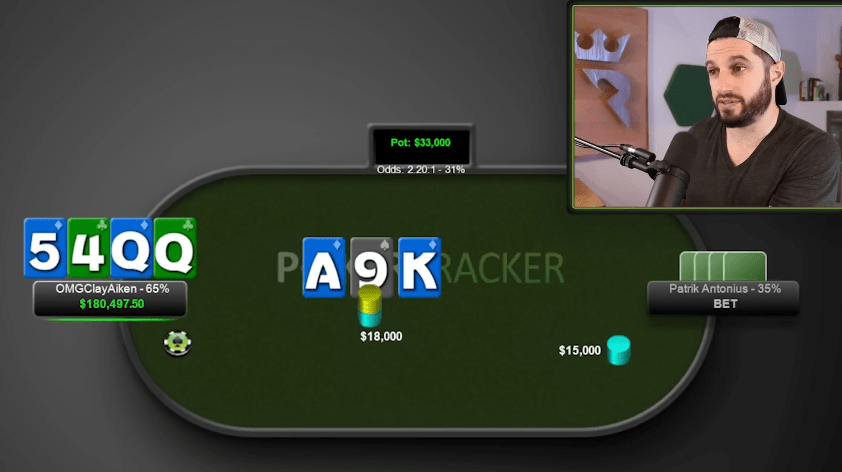
Raise and call a 3-bet 190bb deep. He bets a big continuation bet, and that's fine. I have an easy call.
Phil calls.
Turn ($48,000):
Patrick checks.
I think I should check next. On a board with two flush draws, he can plan to check-shove.
Phil checks.
River ($48,000):
Nice river.
Patrick checks. Phil bets $28,500. Patrick folds.
Well, I'd rather see a half-pot bet, but this sizing is pretty close. I want to represent something like to occasionally get check-raised by .
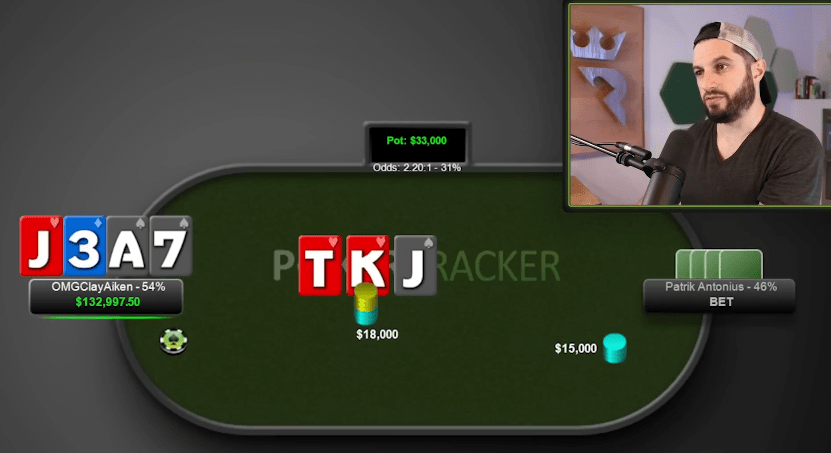
In a 3-bet pot, this c-bet sizing doesn't exist anymore on this texture: the solver doesn't like it, and no one plays like that. Against him, of course, I should fold.
Phil folds.
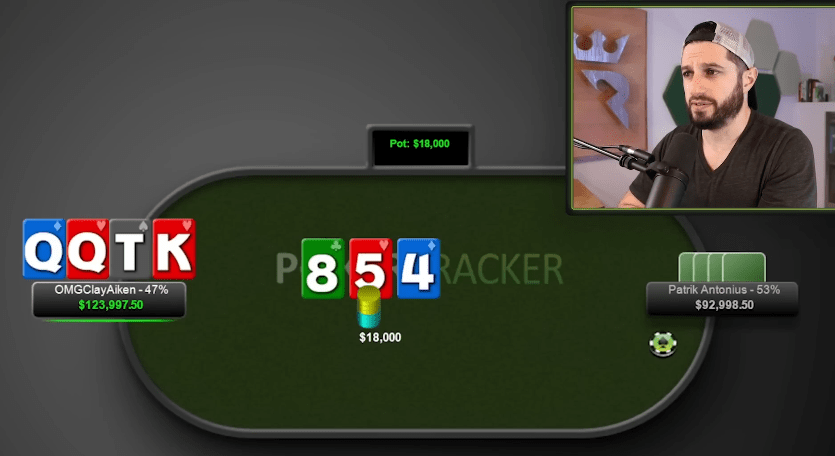
Easy check with full 3-bet range.
Phil checks, Patrick bets $9,000.
To be honest, I don’t know how to answer here correctly, but the check-call is definitely not crazy.
Phil calls.
Turn ($36,000):
Check – check.
River ($36,000):
I think I should bluff on the river. It's hard for me to be here with a worse hand. Of course, he will have a straight very often... but you still need to bluff with some sort of sizing.
Check – check.
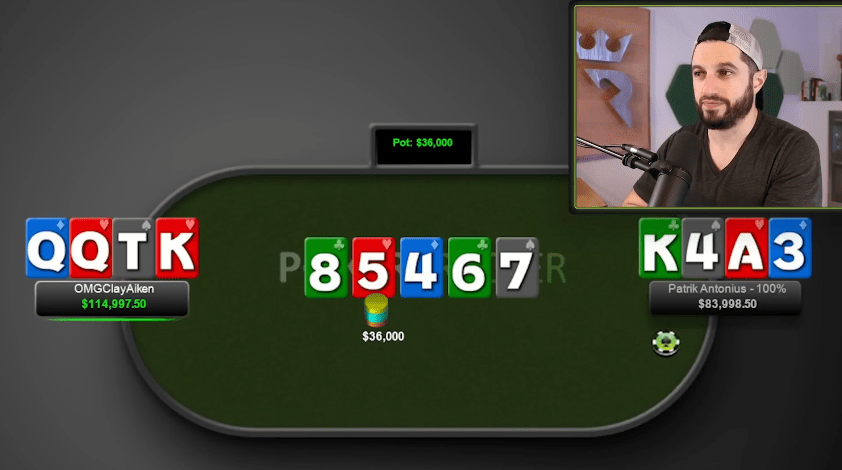
His line on the flop is loose, but within reason, then played correctly.
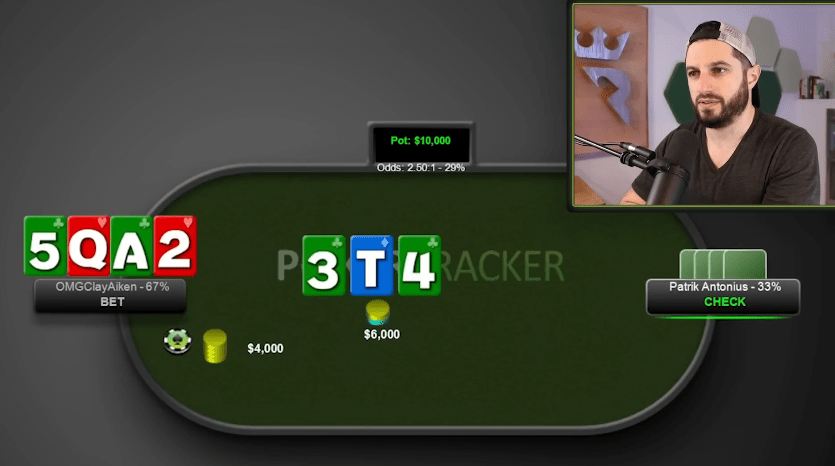
Simple continuation bet.
Patrick calls.
Turn ($14,000):
Patrick bets $14,000.
Haha. Well, there is no such line as an ace lead on the turn. I do not rule out that in rare cases the solver can go for it, but no one plays like that at all.
He bets when I have the super nuts, which is good.
Phil raises to $36,500.
I answer with a small raise – that's right, I like it. If he has a hand that he represents, that is , he can shove it and I get my freeroll. Or if he has straight draws + flush draws or blockers + flush draws, maybe he'll call.
Patrick calls.
River:
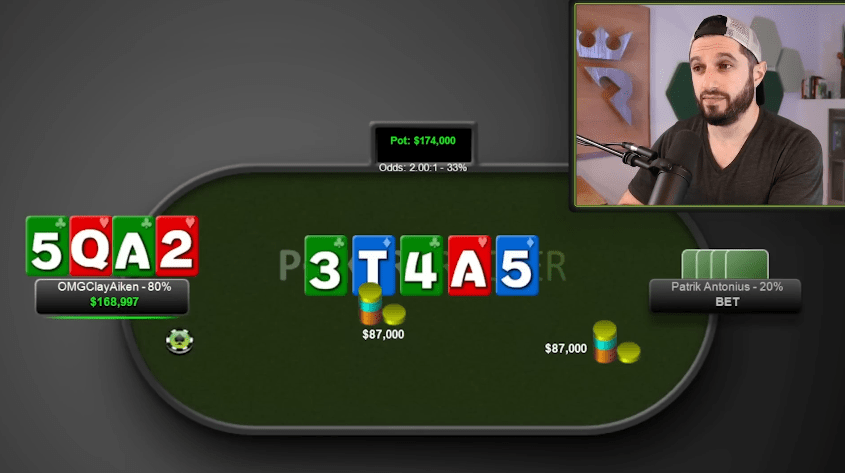
A very dangerous river and he's first to act!
(Long pause.)
Uff... Well, makes sense, but I block the five, that is, having it in my hand turns out to be useful. However, at the time, I thought Patrick was generally under-bluffing, so it wasn't a pleasant situation. Of course, he depicts a hand stronger than mine. Can he put me on aces and get me that way with the wheel? It's possible...
Okay, let's see how I played.
Phil calls.

Cool!
Like I said, the turn bet doesn't make sense, but since he's bet, should he call the raise? I don't think... If all his outs are live, there are 11 or 13 if you count sets. In my opinion, not enough, you need to fold the turn.
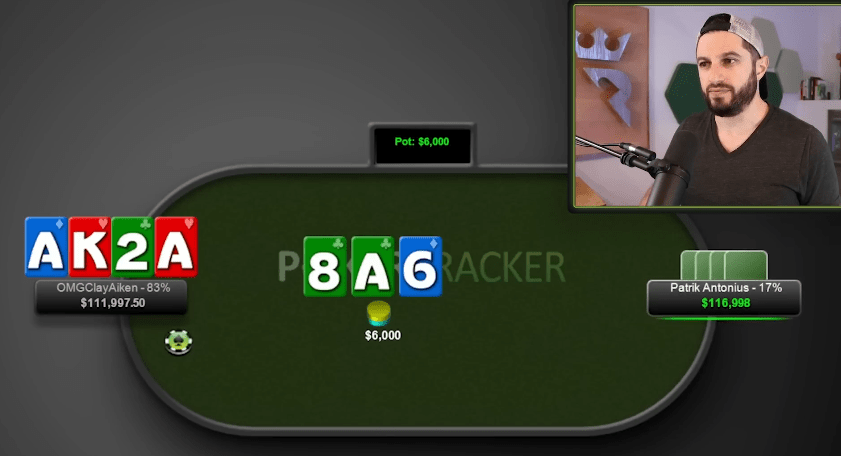
If you flop top set, you can c-bet.
Patrick checks, Phil bets $4,000, gets called.
Turn ($14,000):
Patrick bets $14,000.
And this lead of his is also not according to theory. The question is should I call or raise? Only one straight closed, and with a raise, I can prevent a lot of equity from being realized. However, if I hit a straight, I'm in trouble... but why should he lead? on a board with two flush draws, when is the ideal hand to check-raise? A check-raise will often win the hand on the spot.
So I don't think he has a straight, but let's call the turn and call the river.
Phil calls.
River ($42,000):
Patrick checks.
I think I should bet. He bluffed and most often folded, but it's worth trying to get at least something.
Phil bets $21,500. Patrick calls.
So, what could he have? with a missed draw?.. Or was it strengthened by the king, say, ?
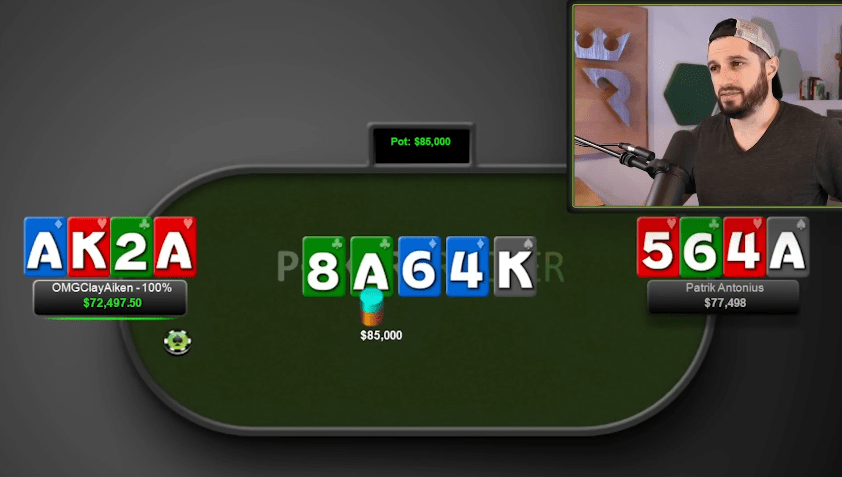
Hmm. Interestingly played. It's hard for me to rate the lead because they shouldn't exist in my world, and his hand selection is also pretty bad.
In general, nothing surprising – we both made a lot of mistakes. At that time, we were the leading players, but if we were transferred from 2010 to 2023, we would look foolish.
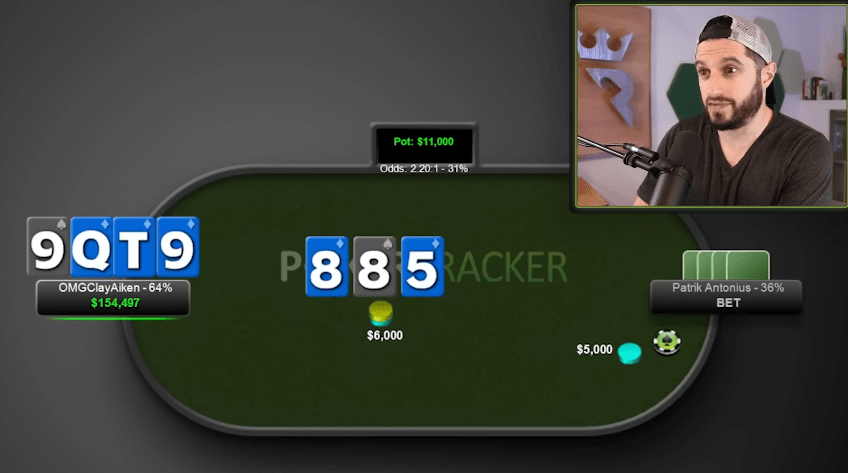
Check-call!
Phil calls.
Turn ($16,000):
Phil checks, Patrick checks.
Standard.
River ($16,000):
I like to check-call, but betting is also not a mistake.
Phil checks, Patrick checks.
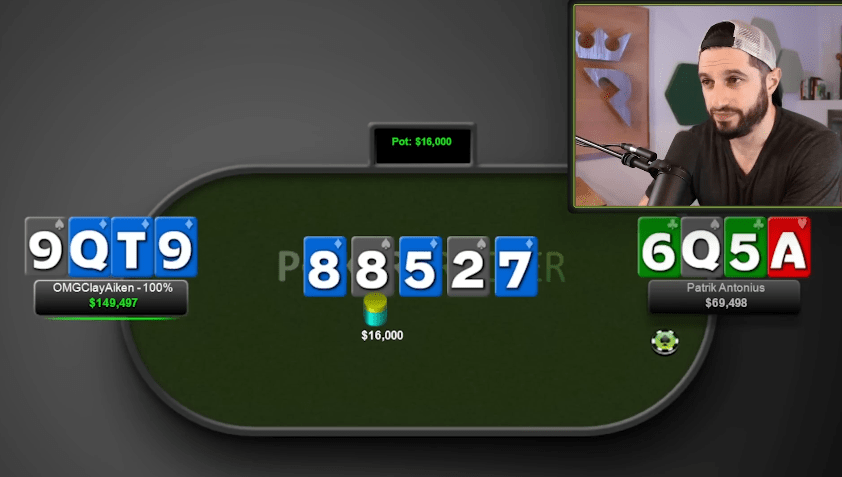
I think with one diamond he could bluff, but without it, it's quite normal to just give up.
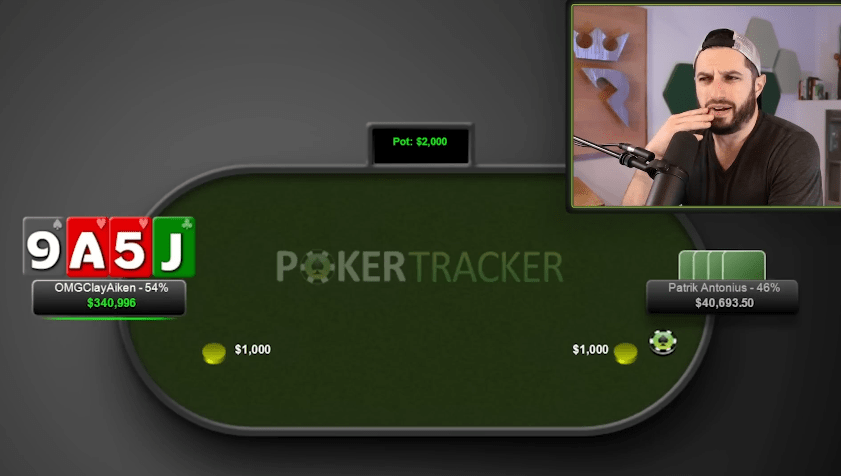
Limped pot and I check?! I have to raise, I don't understand this check.
Flop ($2,000):
Phil checks, Patrick bets $2,000.
Of course I won't fold, I'm just trying to figure out if there's a raise. Probably not.
Phil calls.
Turn ($6,000):
Phil checks, Patrick bets $6,000.
Keeps leading with his limp range! I don't know how to answer. Think you just call.
Phil calls.
River ($18,000):
Now we don't fold.
Phil checks, Patrick checks next.
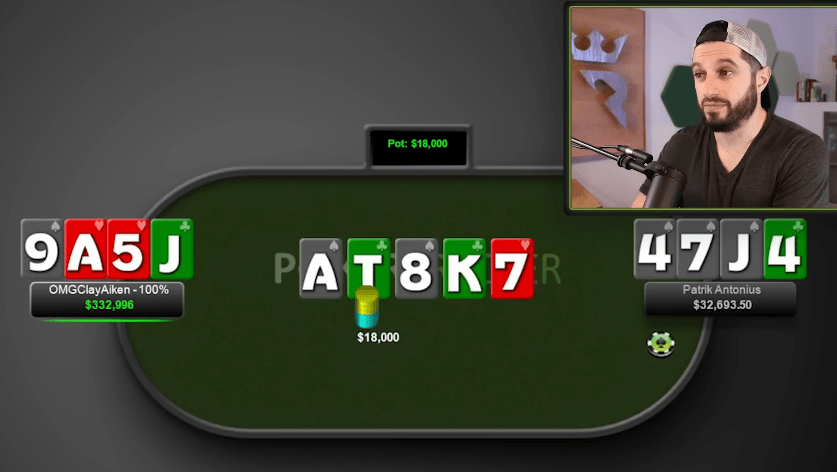
We don't fold, but he doesn't bet either... His limping range shouldn't feel good on this texture. However, his chosen line suits his particular hand very well.

Patrick checks, Phil checks.
Yes, good check.
Turn ($6,000):
Patrick bets $5,000.
Col.
Phil raises to $15,600.
Interesting! And not bad at all!
Patrick folds.
Yeah. Cool. Well played, young Phil.
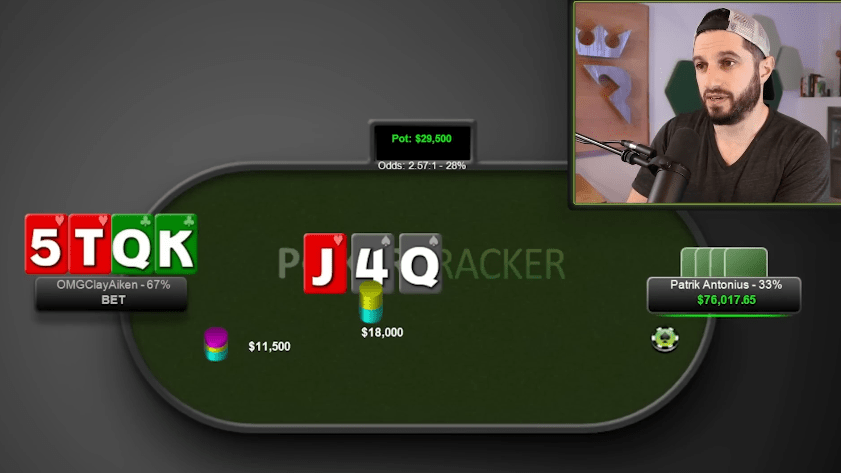
Continuation bet in a 3-bet pot, sizing may vary.
Patrick calls.
Turn ($41,000, effective stack $64,517): Kd
Check?
Phil bets $41,000.
No! Although ... It is clear that after the check I still will not throw it away. The question is how much equity am I not letting pot bet. Pretty decent – there's a lot of flush draw...
No, a full pot still looks excessive. I still prefer a small bet or check.
Patrick folds.
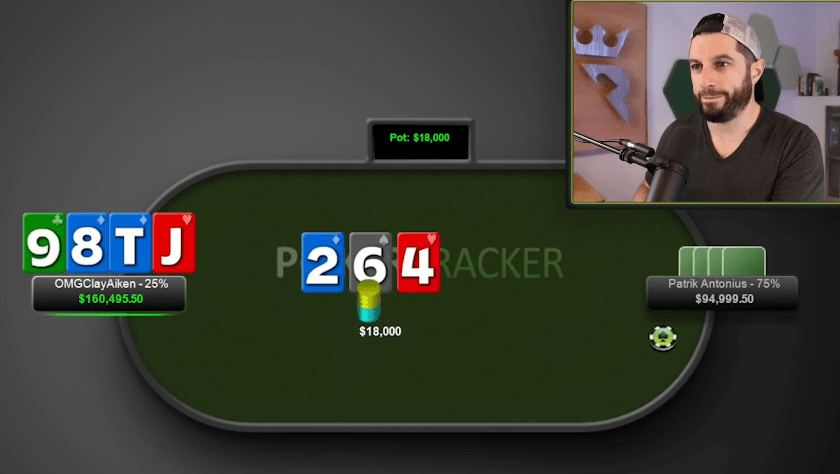
In a 3-bet pot, Phil checks. Patrick bets $9,000. Phil check-raises to $45,000.
Ahaha! Ha ha ha! I mean, I'm just playing check-pot! Bold!
Here's the important thing: you don't need to raise max sizing to bluff. We have already seen in this session that he often bets with rather weak hands on such textures, and this is also quite likely here. So I generally like the idea, but the problem is that I'm risking 45k to take 27k, which means I have to bluff 2/3 of the time. Will it work? Absolutely not guaranteed. But I could do the same by raising up to $32,000.
OK, maybe he won't fold to a smaller check-raise. with a backdoor flush draw, and on this one it will fold. OK.
Patrick folds.
Well, not bad, Phil-2010! You had a fighting spirit!
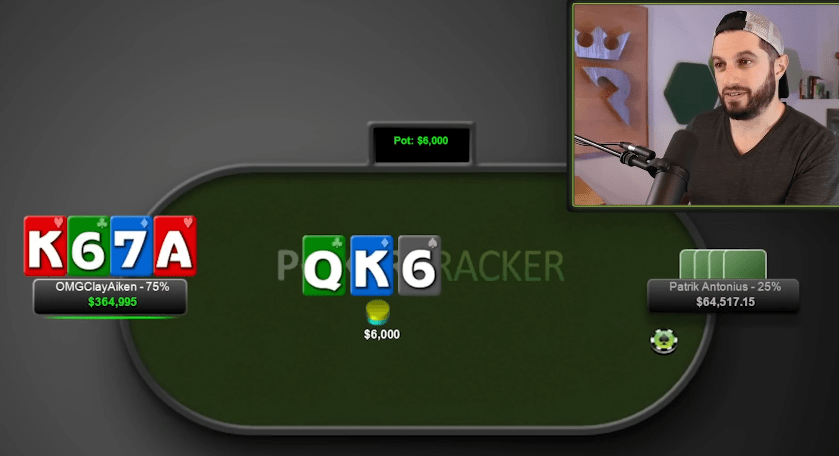
Phil checks, Patrick doesn't c-bet and checks next.
Turn ($6,000):
You have to bet something. I don't remember if anyone was making small bets at the time? Perfect situation for small sizing.
Phil bets $5,000. Patrick calls.
River ($16,000):
Phil checks. Patrick bets $16,000.
I would probably call today.
Phil folds.
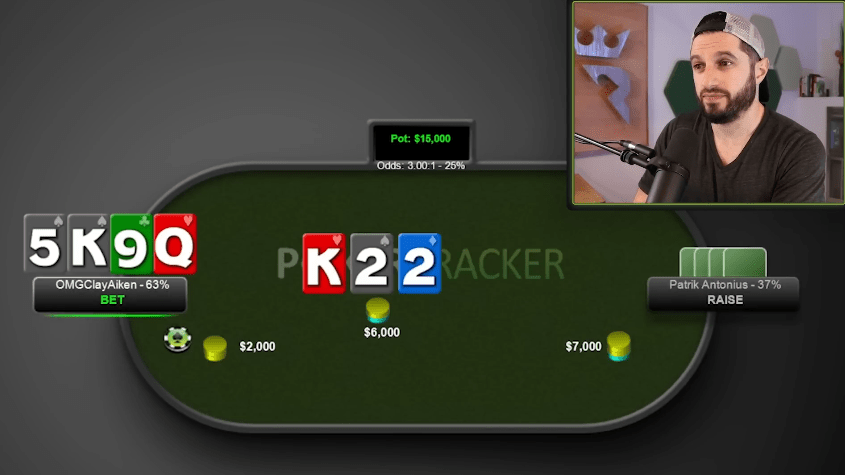
Continuation bet, got a check-raise. Looks like a call.
Phil calls.
Turn ($20,000):
Patrick bets $13,000. Phil calls.
Yes, it's a call.
River ($46,000):
Patrick checks.
Well, checked back, I guess? I can't bet for value.
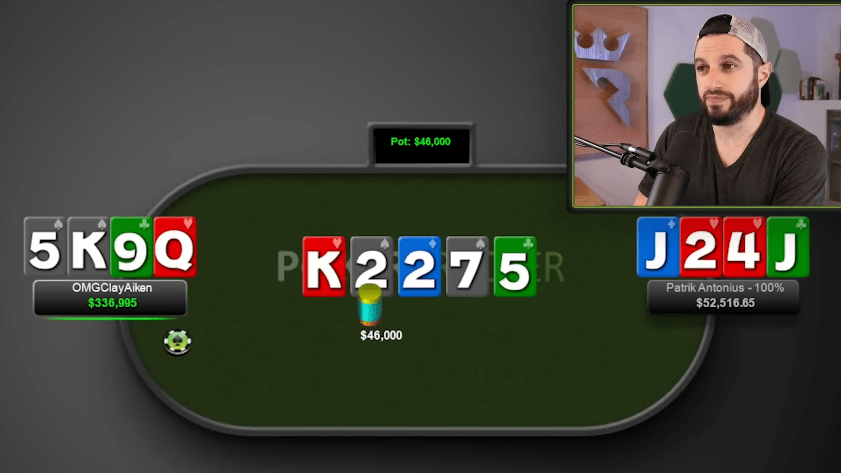
So, he should check-call on the flop. And if you check-raise, you should check on the turn. But his line, of course, is not absurd.
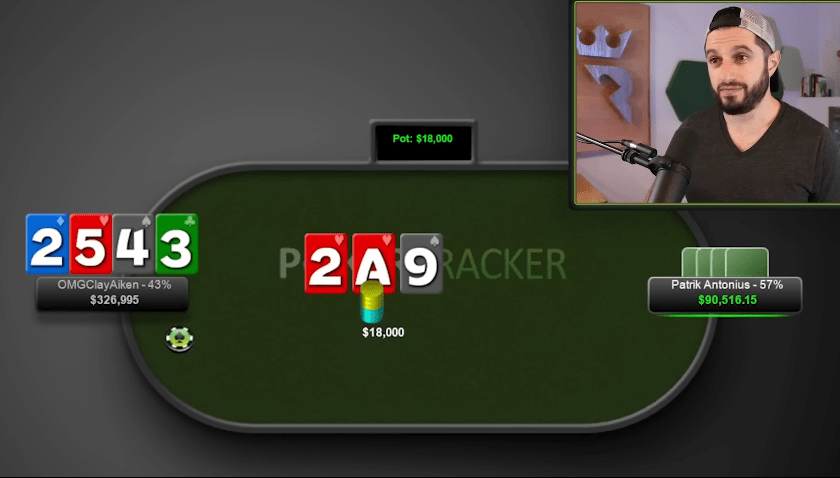
So, it was a preflop open, and I raise and call the 3bet. At that time, I greatly overestimated the series, even the worst series possible. When I started playing Omaha in 2007, I probably even cold-called 3-bets with hands like with the same suit, because they also stand well against aces – about 50 to 50. A common mistake – many others played the same way.
Patrick checks.
When he checks the flop with an ace, I have a pretty good hand to bet.
Phil bets $8,800. Patrick check-raises to $29,000.
A check and a small raise is a bluff or a monster. With my hand, I call anyway.
Phil calls.
Turn ($76,000, effective stack $61,516):
Patrick bets all-in.
Must fold.
Phil folds.
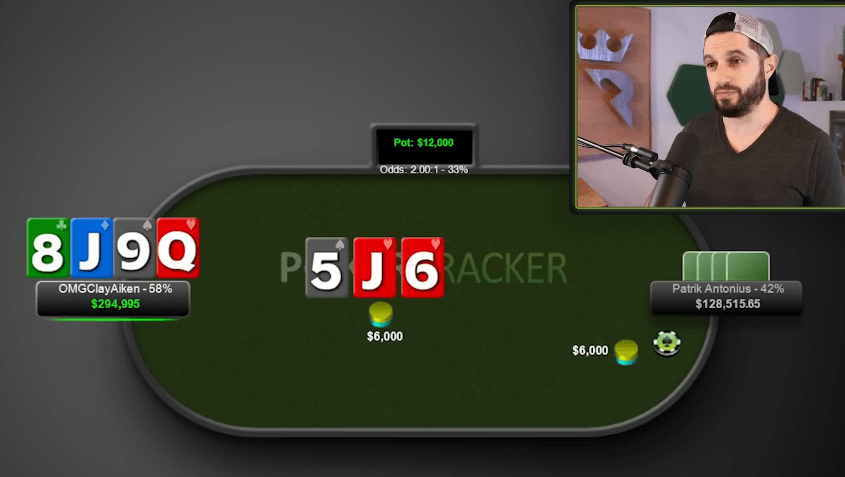
All of a sudden, he c-bets the pot. Before that, I used to bet $5,000. Okay, I call.
Phil calls.
Turn ($18,000):
Easy check-call.
Patrick bets $15,000. Phil calls.
River:
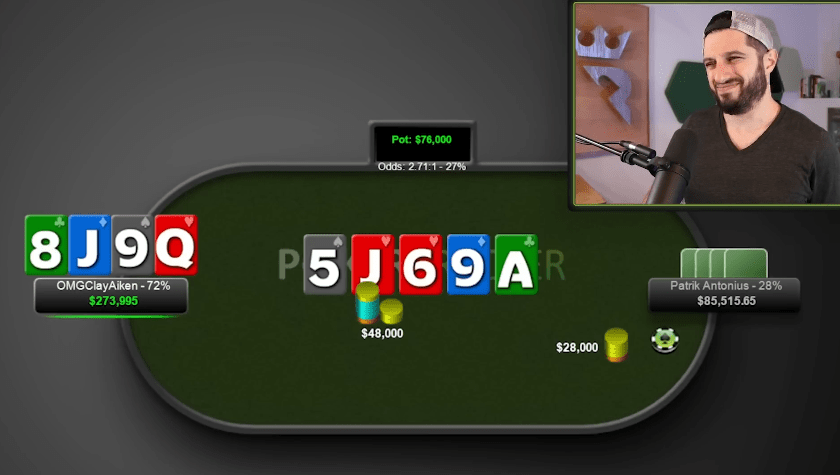
So why is he downsizing? Why? Was he bluffing, but he drove to or ?
When your opponent downsizes, ask yourself two questions: 1) What value hands would he like to downsize with? 2) can he consider downsizing with bluffs? Because when he bets the turn, he's representing a set or a straight. On the river that came out, a set and a straight could easily bet full pot. Downsizing is basically an admission that he was bluffing on the turn.
Okay, we're talking about a hand from 2010, I don't know if my current logic applies to it. Maybe he would play the same way with or . Maybe he thinks the ace is a dangerous card that needs to be sized down to get called. But these days, such a line almost always means a bluff on the turn. And the question is, was he bluffing with and now he doesn't want to bluff with a full pot because he has bad blockers, or with something that hit two ace pair on the river?
I don't have a good answer.
Phil calls.
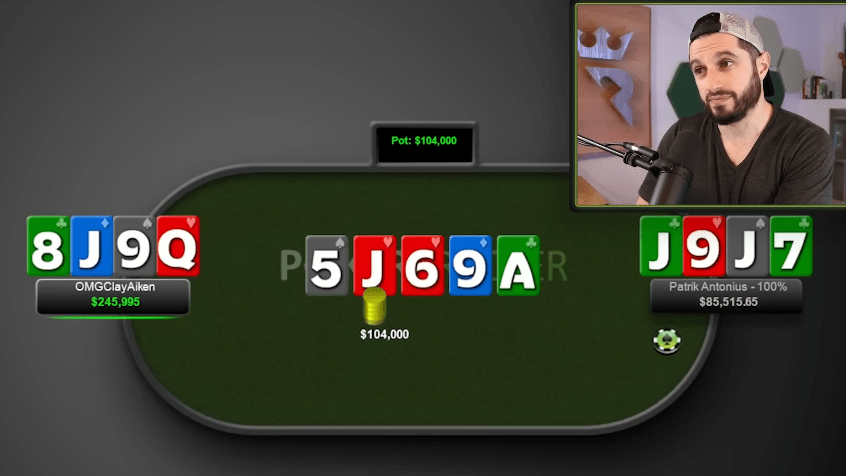
OK. You can bet the pot with this hand. But with his bet, he was able to get me to call!
We're heading to the finish line.
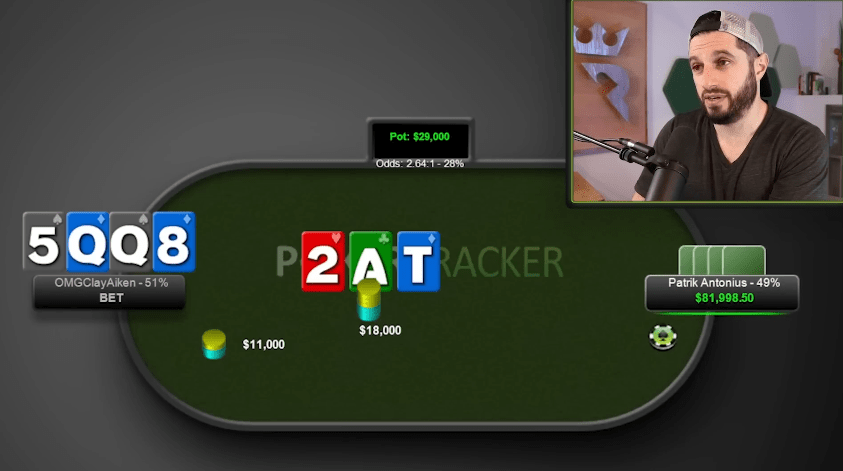
Placed a 3-bet. On this flop I have two sizings – a small pot and a full pot. I would put this hand to small, because it is rather weak.
Patrick folds.
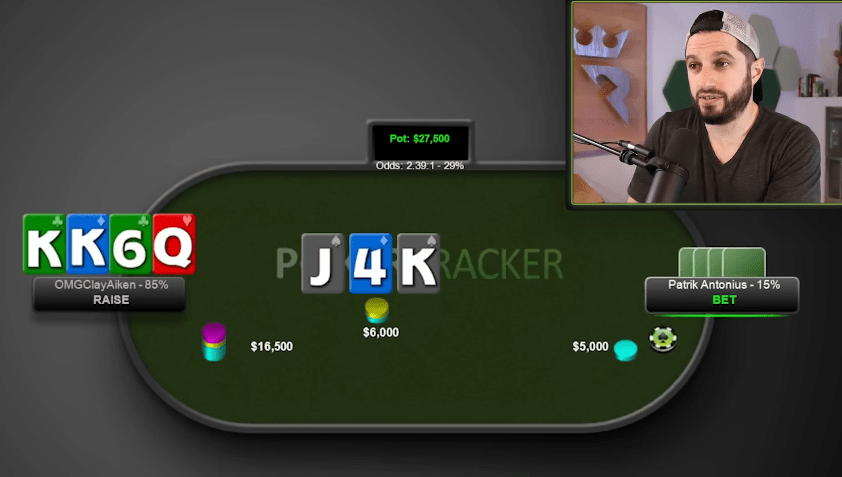
I just call the raise, check-raise the flop with top set. Standard!
Patrick folds.
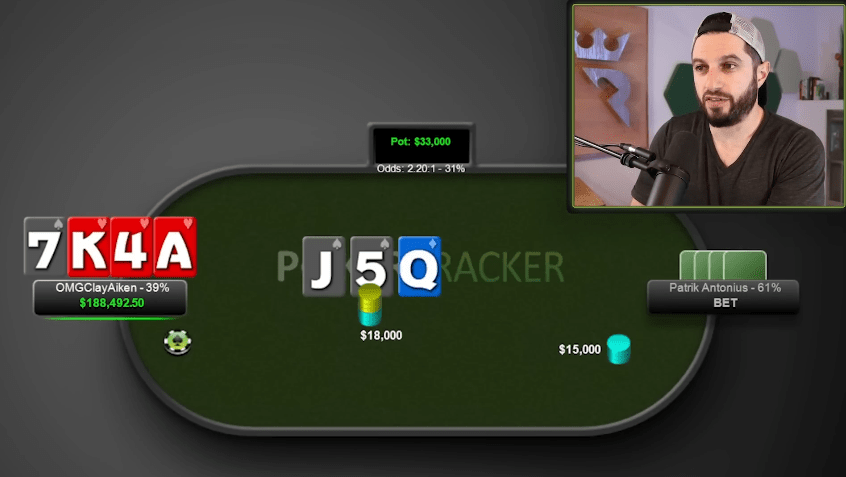
Raise and call the 3-bet. Nothing good on the flop, I fold to a big continuation bet.
That's the whole session!
I went down 100k early on, losing a big two-pair 3-bet pot against a flush draw, but gradually bounced back. Hands dispersed approximately as they should.
I enjoyed the parsing a lot. It's always interesting to go back to the time when I didn't know anything about the theoretically optimal game. As expected, we both made mistakes and deviated from the GTO. However, I also saw a lot of quality hands. Which, in general, is logical, because for 2010 we were very strong players.











